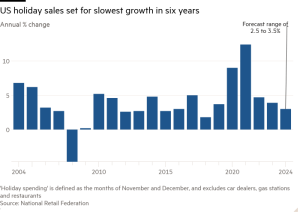Europe’s critical infrastructure is becoming dangerously vulnerable
Unlock the Editor’s Digest for free
Roula Khalaf, Editor of the FT, selects her favourite stories in this weekly newsletter.
The writer is a former Nato secretary-general
As Ukraine enters its third winter of invasion, its critical infrastructure will again come under assault from missiles, drones and cyberattacks. Russia aims to freeze the Ukrainian population into submission and force the authorities in Kyiv to end their resistance. Thanks to a combination of ingenuity and upgrades to its networks, Ukraine is managing to survive. But if such an assault targeted European infrastructure, it is not clear that we would cope nearly as well. Given the explicit threats from our adversaries, that should concern us all.
Russian officials are open that our critical infrastructure would be targeted in the event of a wider escalation in Europe. Its 2000 Military Doctrine refers to destruction of power generation facilities, infrastructure, means of communication and vital installations as key features of modern war. In 2022, a senior Russian official told the UN that commercial satellites could be “legitimate targets for retaliatory strikes”.
Europe’s subsea cables network is a grave cause for concern. Former Russian president Dmitry Medvedev has openly threatened an attack in response to support for Ukraine. These cables carry around 98 per cent of the world’s internet traffic, and three EU countries are fully reliant on them for their connectivity. Without these cables our phones, cars, televisions, even fridges, will cease to function effectively.
The Russian general staff’s main directorate for deep sea research has been linked to sabotage threats to undersea cables. Russian submarine activity to chart the locations of these highly vulnerable cables has also increased significantly, including off the coast of Ireland.
A Russian attack need not take the form of a missile strike. Just before the Paris Olympics, we saw the disruption that can be caused by arson attacks on the high-speed train network. While the perpetrators of this attack were not identified, we must not be naive about the hybrid threats we face. Ireland’s healthcare system was debilitated by a cyberattack from a Russian-based ransomware group in 2021. Russia’s military intelligence Unit 29155 has been behind sabotage campaigns across Europe. It expanded into cyberattacks in 2020, targeting critical infrastructure and government agencies across Nato, often with the aim of disrupting aid deliveries to Ukraine.
Europe needs to learn from Ukraine’s experience and step up its preparations. Well-maintained infrastructure and technology innovation such as quantum computing, AI and advanced cybersecurity are no longer just a question of economic competitiveness; they are critical for our defence and resilience. They should be given resources commensurate to these growing risks and to our total dependency on modern-day connectivity.
Given the enormous investment that is needed, we cannot rely on governments alone to do it. Take digital connectivity. Telecoms companies have invested billions of euros in upgrading and securing the arteries of Europe’s digital economy. However, Europe has a fundamental problem of scale when it comes to infrastructure providers. Mario Draghi identified this in his recent report on Europe’s economic challenges.
In the EU, there are 34 mobile network operators, compared with just three in the US and four in China. This comparative scale unleashes capital to invest in securing infrastructure like subsea cables and upgrading it for future needs. Allowing companies to expand across borders within the EU’s single market should be a priority. It would unlock more investment into infrastructure that is vital to all aspects of our lives.
Without these upgrades we are vulnerable on at least two fronts. First, there is the threat of cyberattacks, kinetic attacks and sabotage. Second, if we do not create the right conditions for Europe’s deep tech innovators to grow and compete globally, the consequences for our place in the world order will be catastrophic. Investing in infrastructure and companies that help drive the adoption of future technologies underpins other capabilities, not least technologies like quantum where we are in a global race with China to crack each other’s encryption capabilities.
Vladimir Putin’s game plan has always been to develop vulnerabilities in Europe that he could exploit. We weaned ourselves off Russian energy after his invasion of Ukraine. Yet, by failing to invest properly in our critical infrastructure — notably our connectivity infrastructure — we are naively creating new vulnerabilities without Putin even lifting a finger. Russia is clear it already has these vulnerabilities in its sights. If we fail to address them, then Europe’s renewed focus on security and defence will count for little.
#Europes #critical #infrastructure #dangerously #vulnerable



